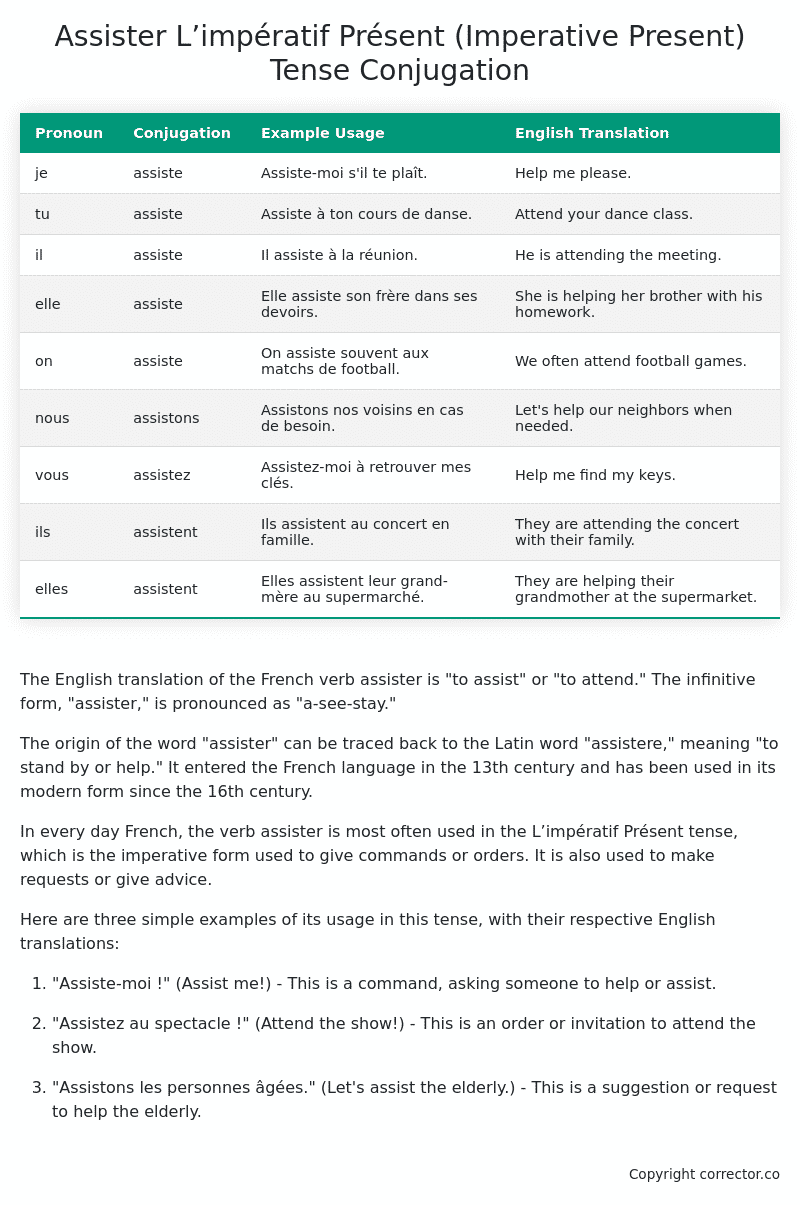L’impératif Présent (Imperative Present) Tense Conjugation of the French Verb assister
Introduction to the verb assister
The English translation of the French verb assister is “to assist” or “to attend.” The infinitive form, “assister,” is pronounced as “a-see-stay.”
The origin of the word “assister” can be traced back to the Latin word “assistere,” meaning “to stand by or help.” It entered the French language in the 13th century and has been used in its modern form since the 16th century.
In every day French, the verb assister is most often used in the L’impératif Présent tense, which is the imperative form used to give commands or orders. It is also used to make requests or give advice.
Here are three simple examples of its usage in this tense, with their respective English translations:
-
“Assiste-moi !” (Assist me!) – This is a command, asking someone to help or assist.
-
“Assistez au spectacle !” (Attend the show!) – This is an order or invitation to attend the show.
-
“Assistons les personnes âgées.” (Let’s assist the elderly.) – This is a suggestion or request to help the elderly.
Table of the L’impératif Présent (Imperative Present) Tense Conjugation of assister
| Pronoun | Conjugation | Example Usage | English Translation |
|---|---|---|---|
| je | assiste | Assiste-moi s’il te plaît. | Help me please. |
| tu | assiste | Assiste à ton cours de danse. | Attend your dance class. |
| il | assiste | Il assiste à la réunion. | He is attending the meeting. |
| elle | assiste | Elle assiste son frère dans ses devoirs. | She is helping her brother with his homework. |
| on | assiste | On assiste souvent aux matchs de football. | We often attend football games. |
| nous | assistons | Assistons nos voisins en cas de besoin. | Let’s help our neighbors when needed. |
| vous | assistez | Assistez-moi à retrouver mes clés. | Help me find my keys. |
| ils | assistent | Ils assistent au concert en famille. | They are attending the concert with their family. |
| elles | assistent | Elles assistent leur grand-mère au supermarché. | They are helping their grandmother at the supermarket. |
Other Conjugations for Assister.
Le Present (Present Tense) Conjugation of the French Verb assister
Imparfait (Imperfect) Tense Conjugation of the French Verb assister
Passé Simple (Simple Past) Tense Conjugation of the French Verb assister
Passé Composé (Present Perfect) Tense Conjugation of the French Verb assister
Futur Simple (Simple Future) Tense Conjugation of the French Verb assister
Futur Proche (Near Future) Tense Conjugation of the French Verb assister
Plus-que-parfait (Pluperfect) Tense Conjugation of the French Verb assister
Passé Antérieur (Past Anterior) Tense Conjugation of the French Verb assister
Futur Antérieur (Future Anterior) Tense Conjugation of the French Verb assister
Subjonctif Présent (Subjunctive Present) Tense Conjugation of the French Verb assister
Subjonctif Passé (Subjunctive Past) Tense Conjugation of the French Verb assister
Subjonctif Imparfait (Subjunctive Imperfect) Tense Conjugation of the French Verb assister
Subjonctif Plus-que-parfait (Subjunctive Pluperfect) Tense Conjugation of the French Verb assister
Conditionnel Présent (Conditional Present) Tense Conjugation of the French Verb assister
Conditionnel Passé (Conditional Past) Tense Conjugation of the French Verb assister
L’impératif Présent (Imperative Present) Tense Conjugation of the French Verb assister (this article)
L’infinitif Présent (Infinitive Present) Tense Conjugation of the French Verb assister
Struggling with French verbs or the language in general? Why not use our free French Grammar Checker – no registration required!
Get a FREE Download Study Sheet of this Conjugation 🔥
Simply right click the image below, click “save image” and get your free reference for the assister L’impératif Présent tense conjugation!

Assister – About the French L’impératif Présent (Imperative Present) Tense
Usage
Giving commands
Making requests
Offering advice
Expressing desires
Conjugation Formation
Interactions with other tenses
Want More?
I hope you enjoyed this article on the verb assister. Still in a learning mood? Check out another TOTALLY random French verb conjugation!


